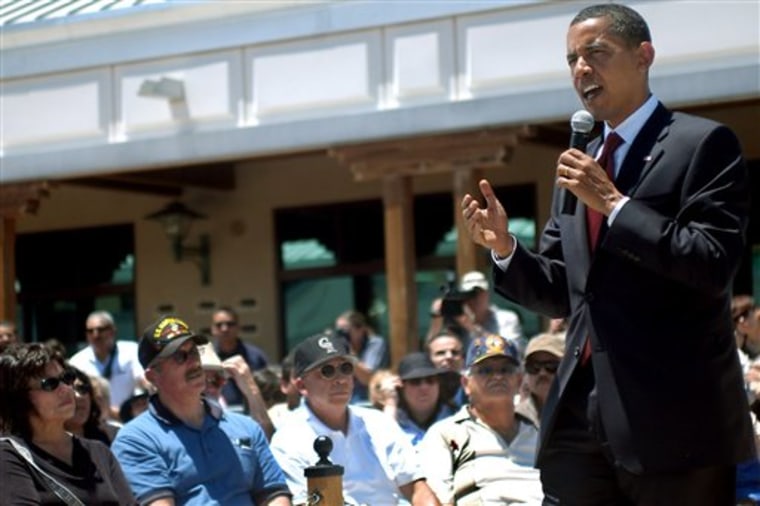Barack Obama is distancing himself from expectations he would meet Iranian President Mahmoud Ahmadinejad and taking a more cautious stand on talking to other U.S. adversaries.
With criticism from Republicans turning harsher as Obama moves closer to winning the Democratic nomination battle against rival Hillary Clinton, the Illinois senator has shifted -- but not abandoned -- his position.
Sen. John McCain, the Republicans' presumptive nominee for the November election, has expressed outrage that Obama would talk to Ahmadinejad, whose country does not recognize Israel and who has branded the Jewish state a "stinking corpse."
"There's definitely been an adjustment in what was initially a pretty categorical position," said Ross Baker, a political scientist a Rutgers University. "As (Obama) has gone around the country campaigning, he has realized he's had to fine-tune his position."
In a CNN presidential candidates debate in July 2007, Obama was asked if he would be willing "without precondition" to meet with the leaders of Iran, Syria, Venezuela, Cuba and North Korea during the first year of his administration.
"I would," Obama said. "And the reason is this, that the notion that somehow not talking to countries is punishment to them -- which has been the guiding diplomatic principle of this administration -- is ridiculous."
That put him at odds not only with Republicans but with Clinton, who said she would pursue more engagement with foes like Iran but not promise a top-level meeting immediately.
Obama later said that though he would not set preconditions on meetings, there would be careful preparations.
He calls President George W. Bush's approach "cowboy diplomacy" and links McCain to the president's foreign policy stance.
But as Republicans have painted him as someone who would be willing to "cozy up" to foes like Ahmadinejad, Cuban leader Raul Castro and Venezuelan President Hugo Chavez, Obama and his advisers have emphasized preparation would precede any meeting with leaders of adversarial countries.
Obama said on Monday he would not guarantee a meeting with Ahmadinejad, since Iran is holding a presidential election in 2009.
"There's no reason why we would necessarily meet with Ahmadinejad before we know that he was actually in power. He's not the most powerful person in Iran," Obama told reporters.
Under Iran's system of clerical rule, the Islamic Republic's religious establishment has final say in all state matters.
The Bush administration's stance on Iran was there would be no meetings unless Tehran agreed to suspend its nuclear enrichment program, Obama said.
"Since presumably that is a major topic of conversation, what that really means is we're not going to talk to Iran, and that's the policy that they've initiated," he said.
Preparations, by contrast, mean making sure that meetings begin "with low-level diplomatic engagement and that there's a clear agenda so that any meetings would be constructive." He also stressed a meeting doesn't guarantee concessions.
In a speech on Latin America last week, Obama said he would be willing to talk to Castro's communist government but "at a time and place of my choosing" and "only when we have an opportunity to advance the interests of the United States."
The McCain campaign accuses Obama of backtracking and says that shows he lacks judgment on foreign policy matters.
Baker of Rutgers University said Obama's shift makes sense politically. A meeting with Ahmadinejad would be unacceptable to Jewish voters whom Obama wants to court. Promising unconditionally talks with Raul Castro might be unpalatable to Cuban-American voters, he said.
"There are mid-course corrections in every campaign," Baker said. "It's better for him to make that course correction now than later in the campaign."
